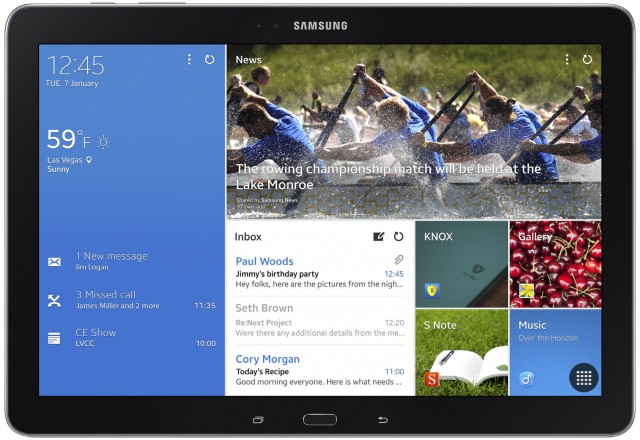Lee Kun-Hee:
“Research & development center(s) should work around the clock, non-stop,”
“get rid of business models and strategies from five, ten years ago and hardware-focused ways.”
Though the South Korean company is currently the largest seller of mobile phones, its traditional strength has been hardware not software.
20 years ago when he urged Samsung executives and employees to “change everything except for your wife and children.”
First Google bought Nest, a clear signal that Google will be entering with conviction into the hardware world,with connected devices in the near future. Then Google meets up at CES in Spain for 'secret talks' with Samsung. Next we hear that Google has sold its 'big mistake', Motorola, to Lenovo in China. And then we hear that they have signed a 10 year agreement with Samsung to share patents.
2014 had always been billed as the year that connected devices and wearable tech take hold, but these rapid-fire developments from two of the largest tech giants on the planet come as a surprise and present the potential for some incredible new products on the market this year.
So where does that leave us?
Google (largest internet company) + Nest (arguably the most influential connected devices innovator)+ Samsung (largest hardware manufacturer) = Amazing opportunities
Background:
When Google acquired Motorola Mobility it looked like it wanted to emulate Apple by having control over hardware and software. As Android became entrenched in the market, Google’s mobile OS became less identified with Google than it did with Samsung, Amazon, and others who were using the platform to sell devices.
Then Google acquired NEST Labs, makers of the NEST thermostat and smoke detectors and it now looks like Tony Fadell and the engineers from NEST will become Google’s in house hardware gang. Google sat down with Samsung and seems to have gotten Samsung to back off some of its UI changes and perhaps quit duplicating Google’s suite of Apps for its services. The two companies agreed to a cross licensing deal going forward. And yesterday, Google agreed to sell much of Motorola Mobility to Lenovo.
Are these moves a sign of a Google reset or reboot? Probably so. Google at some point has to put actions that mean something behind its promises of better controlling the Android experience. Certainly the NEST acquisition is more than about Android, but it certainly brings hardware design brain power under Google’s roof. Samsung is a key partner for Android, but one gets the feeling that Samsung was keen on going its own way. There is a substantial body of thought that Samsung, and others weren’t too pleased with Google having Motorola Mobility held so closely. It made it feel very much like partners were competing with the creator of the OS. Microsoft is in a similar situation with its Surface Tablets. And there is the fact that Motorola Mobility was a loss leader for Google since its acquistion.
The relationship between Google and Samsung has been rather complicated lately. Samsung uses Google's Android OS on nearly all its phones and tablets, but Google competes with Samsung via the Nexus program and Motorola Mobility. Google needs to be careful to not anger Samsung, because Samsung accounts for around 40 percent of Android shipments, and losing the company would be a major blow. Samsung is wary of the amount of control Google has over the OS that powers all its phones, so it tries its hardest to promote its own custom features and self-built apps, which are often poor clones of Google apps.
Google and Samsung have been in a cold war, both continually escalating their possible attack scenarios for when things heat up. Samsung was focused on creating alternatives to all of Google's apps—it has even aimed to cultivate its own app store—in the hope that it could one day fork Android, dump the Google apps, and go out on its own. In the background, Samsung has also been trying to develop Tizen, a competing smartphone OS that it would own from the ground up. Google's nuclear weapon of choice was Motorola. Motorola was owned by Google, but "firewalled" away from the Android Team. With only a reorganization, Google could go fully vertical—Apple style—and build hardware and software together. It could then either stop licensing the Play Store and other Google Apps to its competitors, or play extreme hardball during licensing negotiations. Even Samsung, with all its cloned Google apps, would not have much of a response to being cut off from Google Play Services and the Play Store.
Neither side went through with their plans, because aggression by either company would trigger mutually assured destruction. If Google integrates Motorola and Android, every Android OEM walks, and Google's market share goes down the tubes. If the next Galaxy S phone comes out with forked Android and no Google apps, Samsung's user experience would be horrible—no Gmail, no Google Maps, and no huge Play Store app selection.
All week, we've been seeing signs that the cold war is over. As if some kind of massive treaty was signed, Google and Samsung are best friends now. The current facts are that Google and Samsung signed a patent cross-licensing deal and that they'll be sharing patents for the next 10 years. Google will also sell Motorola and bow out of the smartphone hardware market.

The rest of the information we've heard is unconfirmed, but makes perfect sense in the context of a wide-reaching peace treaty. Re/code reports that Samsung and Google met at CES and started large, sweeping peace talks. The report says the result was “a huge change, a sea change in the last few weeks.” This was reported before news of the Motorola deal hit, so it sounds very credible. Supposedly Samsung will "consider dumping or altering" its Magazine UX interface, which recently debuted at CES on the NotePro and TabPro, and Samsung's devices will "spotlight" Google services, like the Google Play content stores, instead of promoting Samsung-made alternatives. Recode said the results of the talks have "only just begun dribbling out to the public," and the whole report makes Google sound like the victor of the deal.
Still, given the long-term investments Google has made in Motorola, Samsung's concessions seem relatively small. Google is not only losing money on the deal, but also a bunch of employees that were cross-pollinated from Google, including Motorola's CEO, Dennis Woodside, who was a high-ranking Google executive. This was not some kind of pre-planned patent grab by Google—every indication was that Motorola would stick around for a long time. The now-wasted long-term investments and the amount of money Google is losing on the Lenovo deal make this seem like a swift change of heart driven by the Samsung negotiations.
The entirety of the deal is still secret, but we think the basic gist of the deal is that Google stops making hardware and competing with Samsung, and Samsung backs away from software and stops trying to usurp Google's control over Android. The deal makes sense for both companies—Samsung wants to sell hardware, Google wants to make software, show ads, and get data. With Motorola gone and each company having a well-defined role to play, there's no reason for the two to be at each other's throats all the time. The new model is basically Wintel—Samsung plays the part of Intel and makes the hardware, and Google is the new Microsoft, focusing on software.
As we learned with Motorola's "18 month pipeline" quote at the beginning of the Google acquisition, the smartphone market moves very slowly. Touchwiz can't go away overnight, but we'll mostly likely see Samsung tone down its skinning of Android and its associated software add-ons. Magazine UX will still have to be released, but don't expect it on future hardware support. Motorola is as good as gone, but what of Google's Nexus program? There have been rumors that Nexus devices would be dead in 2015, and a deal like this would seem to support that—Samsung doesn't want its software vendor to compete with it in hardware. Since the two companies are so chummy now, Samsung could fulfill any hardware needs that Google has.
It seems like Samsung has the Android hardware market tied up for the foreseeable future. Google was turning Motorola around, and it looked like it would become a serious competitor, but now its future is unclear with Lenovo. The best thing Lenovo could do is "not screw it up," but it's hard to imagine a non-Google OEM shipping stock Android. As for the rest: At around five percent of the Android market, LG is currently the second biggest Android OEM, but its luxury of selling the Android flagship for two years in a row could be coming to an end. HTC is dying, and every phone it releases seems like the last. The rest of the Chinese manufacturers haven't been able to put together a serious flagship yet.
All the details are still emerging, and we'll likely be picking up the pieces of a deal like this for months, but make no mistake, a major event has happened. The two mobile superpowers seem to have switched from co-dependent enemies to market-conquering partners. It will take them a while to get organized, but if they do, will anyone be able to stop Samsung and Google?
http://arstechnica.com/gadgets/2014/01/nuclear-stand-down-google-samsung-and-the-sale-of-motorola-mobility/





